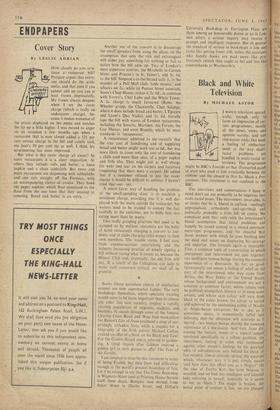ENDPAPERS
Cover Story
By LESLIE ADRIAN But what is this cover charge all about? In some restaurants it is a sheer imposition. At others they include rolls and butter, a linen napkin and a clean tablecloth. But more and more restaurants are dispensing with tablecloths and one eats straight off the Formica, with an accompanying clatter of crocks. They hand out paper napkins which float unnoticed to the floor from the one knee that they succeed in covering. Bread and butter is an extra.
Another use of the couvert is to discourage the small spenders from using the place. on the assumption that only the rich and extravagant will either pay something for nothing or fail to notice how the bill adds up. Two of London's most expensive eateries, the Mirabelle in Curzon Street and Prunier's in St. James's. add 3s. 6d. to the bill. Simpson's-in-the-Strand calls it, in the manner of a Pall Mall club, 'table money.' and whacks on 2s.. while its Panton Street associate, Stone's Chop House, makes it 2s. 6d., in common with Verrey's, Chez Luba and the White Tower. A 2s. charge is much favoured (Rules, the Wheeler group, the Chanterelle, Chez Solange, where it does include bread and butter, L'Epicure and Leoni's Quo Vadis), and ls. 6d. literally tops the bill with scores of London restaurants, including Au Savarin, Martinez, the Forum, the Gay Hussar, and even Bianchi, which by most standards is 'inexpensive.'
A restaurateur admitted to me •recently that the true cost of laundering and of supplying bread and butter might work out at 6d., but was more likely to cover only the cost of laundering a cloth used more than once, of a paper napkin and little else. They might just as well charge for wear and tear on the carpets and furniture (supposing that there were a carpet). He added that if a customer refused to pay the cover charge it would be difficult to enforce. I haven't tried that out yet.
A much fairer way of handling the problem of the small-spending diner is to establish a minimum charge, providing that, it is well dis- played with the menu outside the restaurant, but waiters need to be trained to convey the fact tactfully to the customer, not to bully him into eating more than he wants.
Two really grasping practices that need to be stamped on by militant customers are the habit of hotel restaurants charging a couvert to resi- dents, and of clubs charging table money to their own members. The trouble stems, I feel sure, from expense-account entertaining and the hitherto increasing practice of simply signing a bill without caring what it comes to, because the Diners' Club and, eventually, the old firm will pay. If a touch of the Callaghans can help to make cash customers critical, we shall all be grateful.
Books (those quondam objects of intellectual esteem) are now supermarket fodder. The verj, bookshops themselves, where specialist training would seem to be more important than in almost any other line save corsetry, employ a rapidly rotating population of migrants, students and beatniks. A search through some of the famous Charing Cross Road and West End booksellers for Renan's Life of Jesus produced a crop of sur- prisingly orthodox lives, while a request for a biography of the Irish patriot Michael Collins evoked an offer of a book on the Black and Tans. For the Golden Bough one is referred to garden- ing. A timid inquiry after Gibbon inspired a golden girl in dark glasses to offer The Year of the Gorilla.
I am tempted to describe this treatment in terms of being Foyled, but they have had difficulties enough at the world's greatest bookshop of late. Let it be enough to say that The Times Bookshop in Wigmore Street (and at Printing House Square itself these days), Bumpus, now moved from Baker Street to Davies Street, and Dillon's
University Bookshop in Torrington Place are three among an honourable dozen or so in Lon- don where a serious inquiry may receive a prompt and intelligent response. But in general the standard of service in bookshops is low and looks like getting lower still, unless the assistants who handle books are paid more like pro- fessionals (which they ought to be) and less like counterhands at Woolworth's.
into sub tato


































 Previous page
Previous page